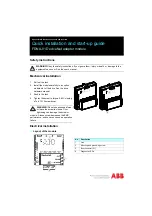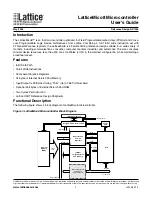
CHAPTER 13 Network
Mediant 4000 SBC | User's Manual
Parameter
Description
■
[1]
Tagged
= (Default for new Ethernet Devices) The Ethernet
Device accepts packets that have the same VLAN ID as the
Ethernet Device and sends packets with this VLAN ID. For all
Ethernet Devices that are associated with the same Ethernet
Group (see 'Underlying Interface' parameter above) and configured
to
Tagged
, incoming untagged packets received on this Ethernet
Group are discarded.
Note:
Only one Ethernet Device can be configured as Untagged per
associated Ethernet Group. In other words, if multiple Ethernet
Devices are associated with the same Ethernet Group, only one of
these Ethernet Devices can be configured to
Untagged;
all the others
must be configured to
Tagged
.
'MTU'
mtu
[DeviceTable_MTU]
Defines the Maximum Transmission Unit (MTU) in bytes per VLAN
(Ethernet Device).
The valid value is 68 to 1,500. The default is 1,500.
Note:
■
MTU is not applicable to SBC Direct Media traffic and to debug
recording traffic.
■
If your first Ethernet Device is configured with an untagged VLAN,
its MTU value is the maximum MTU that can be configured for all
other Ethernet Devices that are associated with the same Ethernet
Group. In other words, if you configure additional Ethernet Devices
(tagged VLANs) that are associated with the same Ethernet Group,
their MTUs must be equal to or less than the MTU of the first
Ethernet Device (untagged VLAN). For example, if the untagged
VLAN is configured with MTU of 100 bytes, you can configure a
tagged VLAN with an MTU value of either 100 bytes or less.
■
If your first Ethernet Device is configured with a tagged VLAN and
you later configure an additional Ethernet Device with an untagged
VLAN that is associated with the same Ethernet Group, the MTU of
the untagged VLAN must be equal to or greater than the highest
MTU value configured out of all the Ethernet Devices (VLANs)
associated with the Ethernet Group. For example, if VLAN 1 is
configured with the highest MTU (100 bytes) out of all your VLANs,
you can configure an untagged VLAN with an MTU value of either
100 bytes or greater.
Configuring IP Network Interfaces
You can configure a single VoIP network interface for all applications, including OAMP
(management traffic), call control (SIP signaling messages), and media (RTP traffic), or you can
configure multiple logical, IP network interfaces for these applications. You may need to logically
separate network segments for these applications for administration and security. This can be
achieved by employing Layer-2 VLANs and Layer-3 subnets. The figure below illustrates a typical
network architecture where the device is configured with three network interfaces, each
representing the OAMP, call control, and media applications. The device is connected to a VLAN-
aware switch for directing traffic from and to the device to the three separated Layer-3 broadcast
domains according to VLAN tags (middle pane).
- 96 -
Summary of Contents for Mediant 4000 SBC
Page 1: ...User s Manual AudioCodes Series of Session Border Controllers SBC Mediant 4000 SBC Version 7 2...
Page 40: ...Part I Getting Started with Initial Connectivity...
Page 48: ...Part II Management Tools...
Page 113: ...Part III General System Settings...
Page 118: ...Part IV General VoIP Configuration...
Page 525: ...Part V Session Border Controller Application...
Page 654: ...Part VI Cloud Resilience Package...
Page 663: ...Part VII High Availability System...
Page 685: ...Part VIII Maintenance...
Page 759: ...Part IX Status Performance Monitoring and Reporting...
Page 844: ...Part X Diagnostics...
Page 888: ...Part XI Appendix...















































